To view a complete list of publications, see my recent CV.
Beeler, D.M. and Jonker, J. (2020). Reiki Practice and Surrender. An Intersection of Body, Spirituality and Religion. Volume 7 in Nijmegen Buddhist and Asian Studies Series, Prof. dr. Paul van der Velde and dr. André van der Braak (ed). Berlin, Münster, Wien, Zürich, London: LIT Verlag.
The authors discuss the religious spiritual healing practice Reiki, revealing components of it that help transform the message held by the alleged life-force called reiki energy into meaning expressed in efficacy for the recipient’s body, mind and spirit. Components that are analyzed include but are not limited to, touch, symbols, initiation, and precepts. The practitioner’s surrender to a combination of internal and external authority – with reiki energy being part of that – is a crux in Reiki practice and one means with which practitioners speak of beneficial effect. This work contributes to academic knowledge about how practicing a religious or spiritual practice may contribute to one’s well-being and flourishing life. Moreover, it explores the question of the nature of Reiki in academic definitions of religion.
Dori-Michelle Beeler is a Medical Anthropologist and Reiki Master.
Jojan L. Jonker is an independent Religious Studies’ scholar and Reiki Master.
Copies are available for purchase at Lit Verlag Publishers online.
 Beeler, D., Paré-Blagoev, E. J., Jacobson, L.A., Ruble, K. (2020). Educating childhood cancer survivors: a qualitative analysis of parents mobilizing social and cultural capital. Journal of Cancer Education. DOI: 10.1007/s13187-020-01709-1.
Beeler, D., Paré-Blagoev, E. J., Jacobson, L.A., Ruble, K. (2020). Educating childhood cancer survivors: a qualitative analysis of parents mobilizing social and cultural capital. Journal of Cancer Education. DOI: 10.1007/s13187-020-01709-1.
Childhood cancer impacts the child patient as well as the family and caregivers throughout diagnosis, treatment, and survivorship. Secondary analysis of qualitative data revealed the critical role of parents’ adaptability and flexibility when navigating advocacy decisions about their child’s schooling following diagnosis and through survivorship. After cancer, adjusting to school means adjusting to a new normal creating challenges related to curriculum, peers, and educators that can affect quality of life. Critically, parents’ adjustment to a new advocacy role emerged as an important consideration. Concepts of social and cultural capital aid in understanding the experiences of parents whose children have returned to school following their successful treatment for pediatric cancer. Framed in this way, how parents mobilize (or do not mobilize) these forms of capital as they devise strategies to support their children are understood. This study interprets parent reports and actions as taken often in the hope that they will help both their own child and others that follow, creating mutual benefit for the network of people touched by cancer.
Keywords: Childhood cancer; Cultural capital; Education; Qualitative analysis; Social capital; Survivorship.
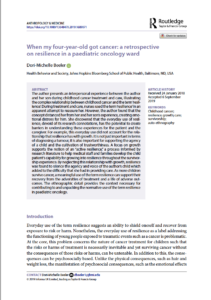 Beeler, D.M., (2019). When my four-year-old got cancer: a retrospective on resilience in a paediatric oncology ward. Anthropology & Medicine, pp.1-16.
Beeler, D.M., (2019). When my four-year-old got cancer: a retrospective on resilience in a paediatric oncology ward. Anthropology & Medicine, pp.1-16.
DOI: 10.1080/13648470.2019.1689071
The author presents an interpersonal experience between the author and her son during childhood cancer treatment and care, illustrating the complex relationship between childhood cancer and the term ‘resilience’. During treatment and care, nurses used the term ‘resilience’ in an apparent attempt to reassure her. However, the author found that the concept distanced her from her and her son’s experience, creating emotional distress for him. She discovered that the everyday use of resilience, devoid of its research connotations, has the potential to create barriers in understanding these experiences for the patient and the caregiver. For example, this everyday use did not account for the relationship that resilience has with growth. It is not just important in terms of diagnosing a tumour, it is also important for supporting the agency of a child and the cultivation of trustworthiness. A focus on growth supports the notion of an “active resilience,” a process informed by research literature to help medical staff and families develop the child patient’s capability for growing into resilience throughout the survivor-ship experience. By neglecting this relationship with growth, resilience was found to silence the agency and voice of the author’s child which added to the difficulty that she had in providing care. As more children survive cancer, a meaningful use of the term resilience can support their recovery from the adversities of treatment and a life of adverse outcomes. The ethnographic detail provides the context necessary for contributing to and unpacking the normative use of the term resilience in paediatric oncology.
This article can be viewed at Taylor & Francis online.
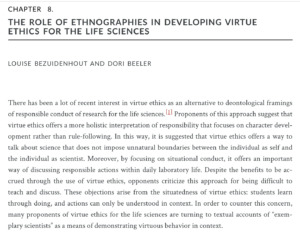
 Bezuidenhout, L. and Beeler, D. (2019). “The Role of Ethnographies in Developing Virtue Ethics for the Life Sciences.” In Deane-Drummond, Celia, Stapleford, Thomas A. and Narvraez, Darcia (eds.) Virtue and the Practice of Science: Multidisciplinary Perspectives E-Book. Notre Dame: Center for Theology, Science & Human Flourishing. https://virtueandthepracticeofscience.pressbooks.com/
Bezuidenhout, L. and Beeler, D. (2019). “The Role of Ethnographies in Developing Virtue Ethics for the Life Sciences.” In Deane-Drummond, Celia, Stapleford, Thomas A. and Narvraez, Darcia (eds.) Virtue and the Practice of Science: Multidisciplinary Perspectives E-Book. Notre Dame: Center for Theology, Science & Human Flourishing. https://virtueandthepracticeofscience.pressbooks.com/
“Ethnographies are largely overlooked by educators and ethicists alike, yet represent a wealth of detailed contextual material about daily laboratory life that can be put to work in virtue ethics discussions.”
This work has contributed to the understanding of the role that ethnographies have in developing a virtue ethics approach for the life sciences. Throughout, my co-author and I build an argument for a “boundary ethics” that distinguishes credibility and authority in scientific practice, identifying the scientist as a citizen with social responsibility.
Beeler, D.M. and Jojan, J. (2019). “Healing and Religion.” In Oxford Bibliographies in Anthropology. Ed. John Jackson. New York: Oxford University Press.
This work is only available to academics on Oxford Bibliographies, a database that serves as an authoritative guide to current scholarship on select topics, containing original commentary and annotations.
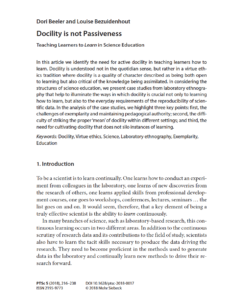
Beeler, D. and Bezuidenhout, L. (2018). Docility is not Passiveness: Teaching Learners to Learn in Science Education. Philosophy, Theology and the Sciences (PTSc) 5, 216–238. DOI 10.1628/ptsc-2018-0017.
In this article, we identify the need for active docility in teaching learners how to learn. Docility is understood not in the quotidian sense, but rather in a virtue ethics tradition where docility is a quality of character described as being both open to learning but also critical of the knowledge being assimilated. In considering the structures of science education, we present case studies from laboratory ethnography that help to illuminate the ways in which docility is crucial not only to learning how to learn, but also to the everyday requirements of the reproducibility of scientific data. In the analysis of the case studies, we highlight three key points: first, the challenges of exemplarity and maintaining pedagogical authority; second, the difficulty of striking the proper ‘mean’ of docility within different settings; and third, the need for cultivating docility that does not silo instances of learning.
This article can be viewed at Mohr Siebeck.
Eisenhauer, S. and Beeler, D. (2018) “Risky Play – in or out? A revival of experiential learning.” Anthropology of Children and Youth Interest Group website, June 24, 2018. http://acyig.americananthro.org/2018/07/24/risky-play-in-or-out-a-revival-of-experiential-learning/
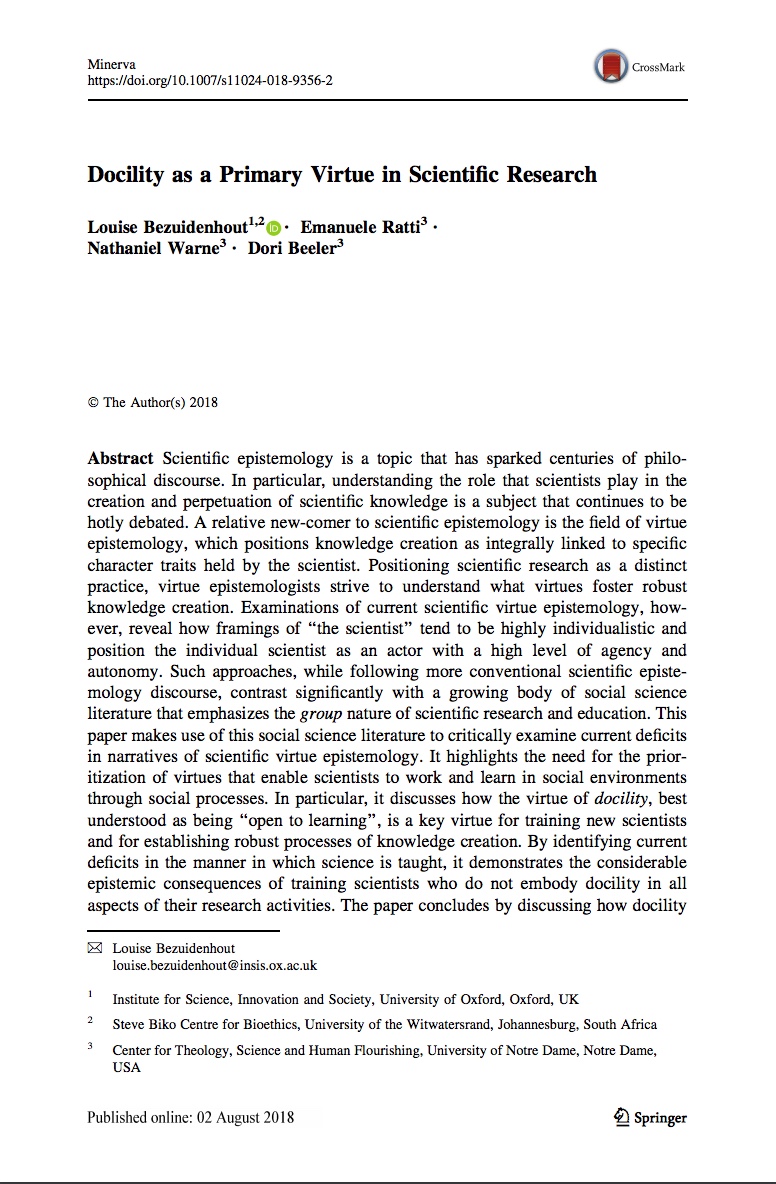 Bezuidenhout L., Ratti E., Warne N., Beeler, D. (2018). Docility as a Primary Virtue in Scientific Research. Minerva, 1-18. Published online: 02 Aug 2018. 10.1007/s11024-018-9356-2.
Bezuidenhout L., Ratti E., Warne N., Beeler, D. (2018). Docility as a Primary Virtue in Scientific Research. Minerva, 1-18. Published online: 02 Aug 2018. 10.1007/s11024-018-9356-2.
Scientific epistemology is a topic that has sparked centuries of philosophical discourse. In particular, understanding the role that scientists play in the creation and perpetuation of scientific knowledge is a subject that continues to be hotly debated. A relative new-comer to scientific epistemology is the field of virtue epistemology, which positions knowledge creation as integrally linked to specific character traits held by the scientist. Positioning scientific research as a distinct practice, virtue epistemologists strive to understand what virtues foster robust knowledge creation. Examinations of current scientific virtue epistemology, however, reveal how framings of “the scientist” tend to be highly individualistic and position the individual scientist as an actor with a high level of agency and autonomy. Such approaches, while following more conventional scientific epistemology discourse, contrast significantly with a growing body of social science literature that emphasizes the group nature of scientific research and education. This paper makes use of this social science literature to critically examine current deficits in narratives of scientific virtue epistemology. It highlights the need for the prioritization of virtues that enable scientists to work and learn in social environments through social processes. In particular, it discusses how the virtue of docility, best understood as being “open to learning”, is a key virtue for training new scientists and for establishing robust processes of knowledge creation. By identifying current deficits in the manner in which science is taught, it demonstrates the considerable epistemic consequences of training scientists who do not embody docility in all aspects of their research activities. The paper concludes by discussing how docility may be considered a key factor in an alternate understanding of the current reproducibility crisis in modern science.
This article can be downloaded at Springer Online.
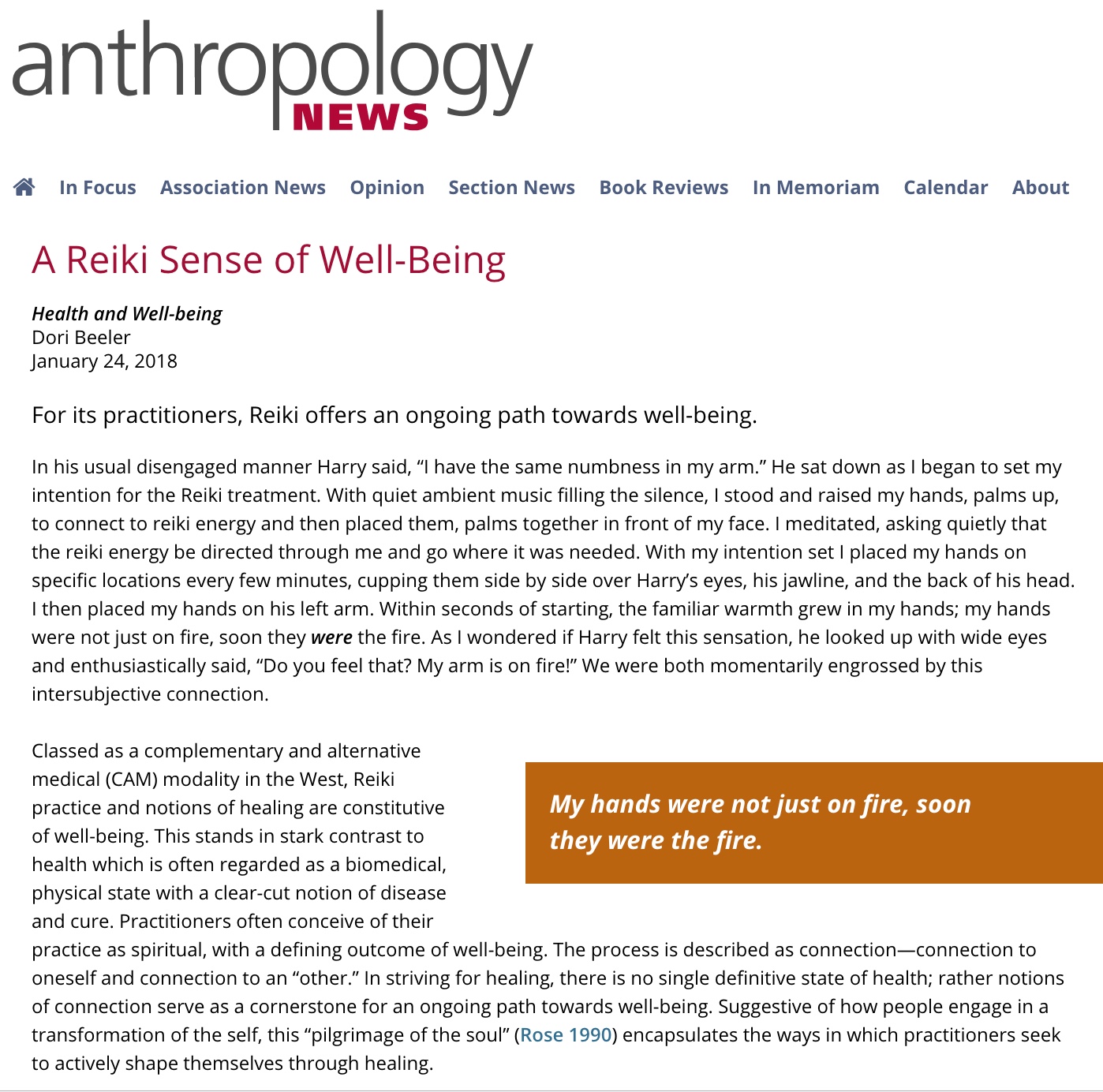 Beeler, Dori (2018). “A Reiki Sense of Well-being.” Anthropology News website, January 24, 2018. DOI: 10.1111/AN.747.Health and well-being are often used synonymously. This has implications for understanding how, and indeed if, these two terms are linked. This contribution will present ethnographic data on Reiki practice in Britain in order to consider these links, where practitioners believe well-being to be something distinct; it is the aggregate balancing of mind, body, spirit, and emotion. Reiki is a form of hands-on-healing with roots in a Japanese tradition promoted by Mikao Usui in 1922. As it is practiced in the West, Reiki fosters specific values that underpin well-being. For example, as suggested by this group, being connected, having connection with a community, or something greater than oneself, enables a sense of well-being. Well-being, then, can be derived as subjectively expressed and experienced within cultural and environmental contexts. Furthermore, and specifically in the West, spirituality is regarded as the essence of what creates connection. This aspect makes it clear that there is a difference between health and well-being. While healthcare has historically promoted health as a physical condition with a finite endpoint, well-being implies processes that seek to regain a state of balance in all things as a pilgrimage of the soul. Reiki practitioners might suggest this pilgrimage of the soul is a spiritual journey seeking connection to something greater than themselves. This connection, it can be argued, is not an endpoint in itself as suggested by health, rather it is the cornerstone of a path to well-being.
Beeler, Dori (2018). “A Reiki Sense of Well-being.” Anthropology News website, January 24, 2018. DOI: 10.1111/AN.747.Health and well-being are often used synonymously. This has implications for understanding how, and indeed if, these two terms are linked. This contribution will present ethnographic data on Reiki practice in Britain in order to consider these links, where practitioners believe well-being to be something distinct; it is the aggregate balancing of mind, body, spirit, and emotion. Reiki is a form of hands-on-healing with roots in a Japanese tradition promoted by Mikao Usui in 1922. As it is practiced in the West, Reiki fosters specific values that underpin well-being. For example, as suggested by this group, being connected, having connection with a community, or something greater than oneself, enables a sense of well-being. Well-being, then, can be derived as subjectively expressed and experienced within cultural and environmental contexts. Furthermore, and specifically in the West, spirituality is regarded as the essence of what creates connection. This aspect makes it clear that there is a difference between health and well-being. While healthcare has historically promoted health as a physical condition with a finite endpoint, well-being implies processes that seek to regain a state of balance in all things as a pilgrimage of the soul. Reiki practitioners might suggest this pilgrimage of the soul is a spiritual journey seeking connection to something greater than themselves. This connection, it can be argued, is not an endpoint in itself as suggested by health, rather it is the cornerstone of a path to well-being.
This article can be viewed at Anthropology News.
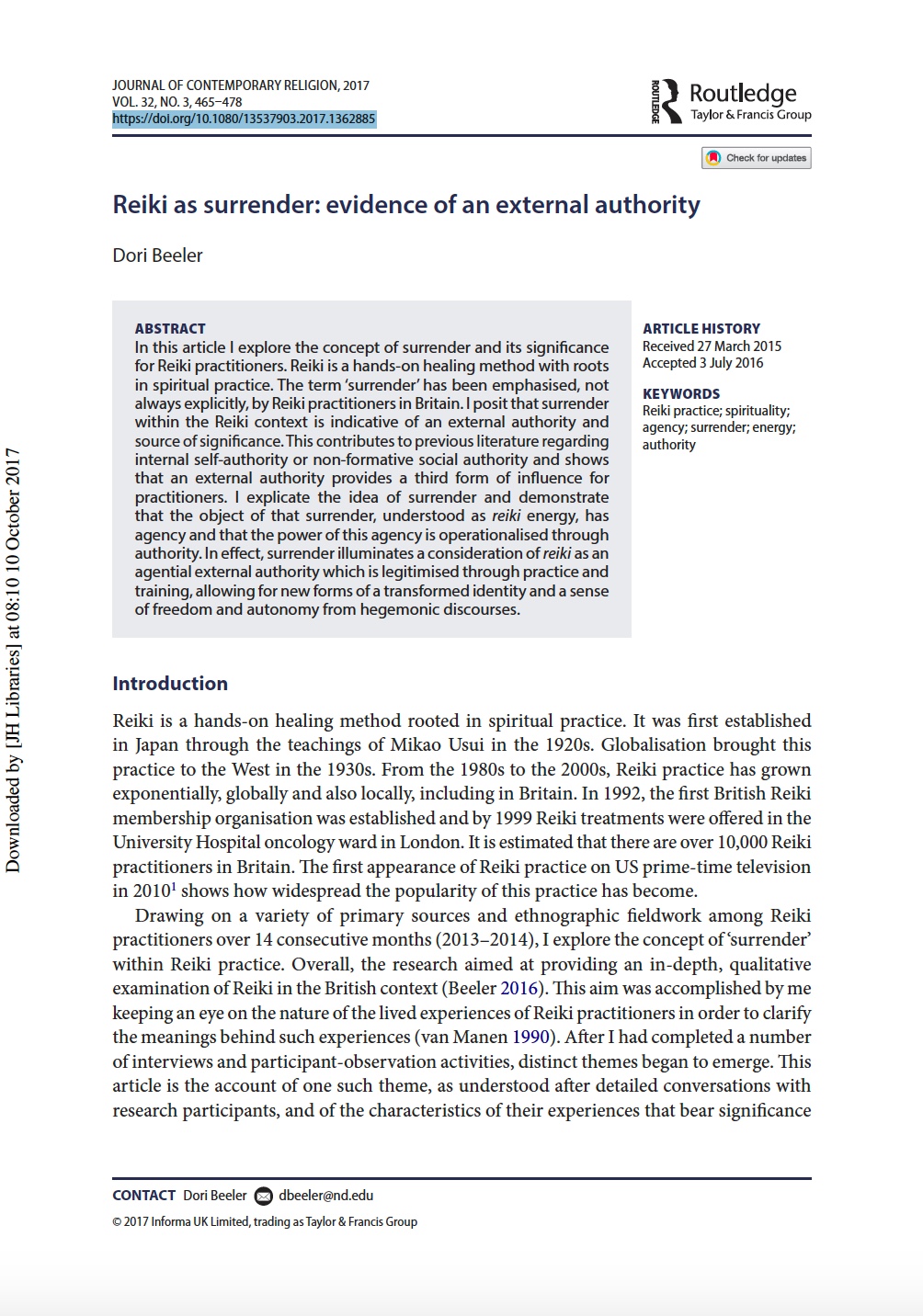 Beeler, D.M. (2017) Reiki as Surrender: Evidence of an External Authority. Journal of Contemporary Religion, Volume 32, Issue 3, 465-478. Accepted 03 Jul 2016, Published online: 14 Sep 2017.
Beeler, D.M. (2017) Reiki as Surrender: Evidence of an External Authority. Journal of Contemporary Religion, Volume 32, Issue 3, 465-478. Accepted 03 Jul 2016, Published online: 14 Sep 2017.
“…a Reiki Master for over 20 years and a Buddhist since childhood, [Aaron] referred to surrender more specifically as ‘self-surrender’. He clarified that it was surrender to the universal energy (reiki).” An excerpt, page 469.
In this article, I explore the concept of surrender and its significance for Reiki practitioners. Reiki is a hands-on healing method with roots in spiritual practice. The term ‘surrender’ has been emphasised, not always explicitly, by Reiki practitioners in Britain. I posit that surrender within the Reiki context is indicative of an external authority and source of significance. This contributes to previous literature regarding internal self-authority or non-formative social authority and shows that an external authority provides a third form of influence for practitioners. I explicate the idea of surrender and demonstrate that the object of that surrender, understood as reiki energy, has agency and that the power of this agency is operationalised through authority. In effect, surrender illuminates a consideration of reiki as an agential external authority which is legitimised through practice and training, allowing for new forms of a transformed identity and a sense of freedom and autonomy from hegemonic discourses.
This article can be viewed at Taylor and Francis Online.
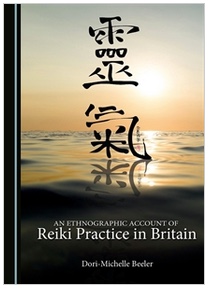 Beeler, D.M. (2016). An Ethnographic Account of Reiki Practice in Britain. Newcastle-Upon-Tyne: Cambridge Scholars Publishing.The result of 14 months of ethnographic research, this study, while filling a gap in the qualitative literature on Reiki practice, contributes an ethnographic portrayal of a particular group’s construction of well-being. Contributing to medical anthropology, the research findings demonstrate culturally situated ideas and practices related to health wherein the intersubjective nature of healing is a constitutive element for well-being. The distinctions of this are specific to culture and environment, broadening how spirituality and well-being are conceptualized anthropologically. In addition, this book offers a framework for the commoditization of Complementary and Alternative Medicine (CAM), a process where products become a simple commodity. For Reiki practice, this results in spirituality being out of place in the healthcare market. The book will be of interest to academics interested in CAM research and Reiki practitioners alike.
Beeler, D.M. (2016). An Ethnographic Account of Reiki Practice in Britain. Newcastle-Upon-Tyne: Cambridge Scholars Publishing.The result of 14 months of ethnographic research, this study, while filling a gap in the qualitative literature on Reiki practice, contributes an ethnographic portrayal of a particular group’s construction of well-being. Contributing to medical anthropology, the research findings demonstrate culturally situated ideas and practices related to health wherein the intersubjective nature of healing is a constitutive element for well-being. The distinctions of this are specific to culture and environment, broadening how spirituality and well-being are conceptualized anthropologically. In addition, this book offers a framework for the commoditization of Complementary and Alternative Medicine (CAM), a process where products become a simple commodity. For Reiki practice, this results in spirituality being out of place in the healthcare market. The book will be of interest to academics interested in CAM research and Reiki practitioners alike.
Copies are available for purchase at Cambridge Scholars Publishing online.
To view the most recent errata of the book, click here.
